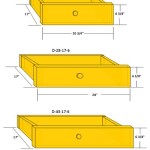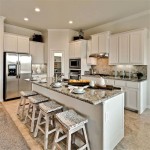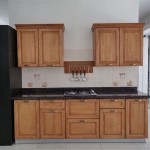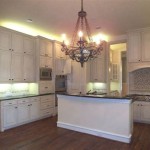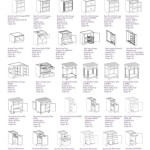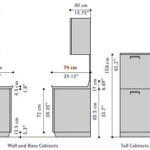How to Plan Kitchen Cabinets: A Comprehensive Guide
Kitchen cabinets are an essential part of any kitchen, providing storage, functionality, and style. Planning them carefully is crucial to create a kitchen that is both practical and aesthetically pleasing.
Here is a comprehensive guide to help you plan kitchen cabinets:
1. Determine Your Storage Needs
Start by assessing your storage requirements. Consider the items you need to store in your kitchen, such as dishes, utensils, food, and appliances. Determine how much space you need for each category to ensure you have sufficient storage.
2. Choose the Right Cabinet Types
There are various types of kitchen cabinets to choose from, each serving a specific purpose. Base cabinets are typically used for storage under the countertop, while wall cabinets are mounted above the countertop. Pantry cabinets offer ample vertical storage space, and island cabinets provide additional storage and functionality.
3. Plan the Layout
The layout of your cabinets should maximize functionality while creating a visually appealing space. Consider the work triangle, which connects the sink, refrigerator, and stovetop. Place cabinets strategically to improve workflow and minimize movement.
4. Choose the Style and Materials
The style and materials of your kitchen cabinets can significantly impact the overall look of the kitchen. Select cabinets that complement the existing décor and consider factors such as durability, finish, and ease of cleaning.
5. Plan for Special Features
In addition to storage, cabinets can offer special features to enhance functionality. Consider adding pull-out drawers for easy access to deep corner cabinets, rollout trays for pots and pans, or lazy Susans for increased accessibility.
6. Consider Lighting
Proper lighting is essential for visibility and ambiance. Incorporate under-cabinet lighting or task lighting within the cabinets to illuminate workspaces and improve functionality.
7. Invest in Quality Hardware
The hardware on your cabinets, such as handles and hinges, plays a critical role in the overall appearance and durability. Choose high-quality hardware that complements the style of the cabinets and provides smooth operation.
8. Hire a Professional if Needed
If you are not confident in your ability to plan kitchen cabinets effectively, consider hiring a professional kitchen designer. They can provide expert guidance, assist with design and layout, and ensure the cabinets are installed correctly.
By following these steps, you can plan kitchen cabinets that meet your storage needs, enhance functionality, and complement the style of your kitchen.

Kitchen Cabinets 101 Cabinet Shapes Styles Cabinetcorp

Kitchen Cabinet Design Tutorials

How To Organize Your Kitchen Cabinets Step By Project The Container

Do It Yourself Kitchen Cabinets Installation Design Layout Kosher Cabinet

How To Design A Traditional Kitchen With Diy Cabinets

Kitchen Drawing Plan Granite Quartz Countertops Cabinets Factory

Wooden Building Kitchen Cabinets Plans Diy Blueprints Cabinet Design

Kitchen Cabinet Plans Pictures Options Tips Ideas

10x10 Kitchen Cabinets Find Out What Is A

Design Your Own Kitchen

